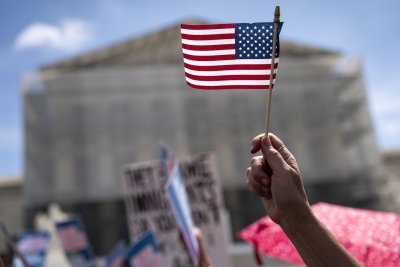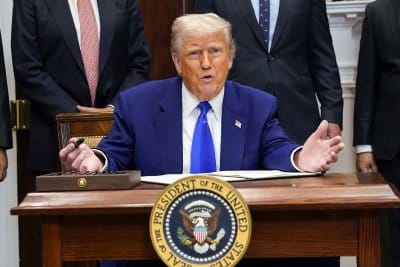Supreme Court rules Trump can fire 2 agency heads, at least for now

May 22 (UPI) — The Supreme Court ruled Thursday in favor of President Donald Trump‘s firing of two Democratic board members of independent oversight agencies as litigation over their removal continues.
The conservative-leaning high court ruled 6-3 in support of the government’s request for an emergency order staying several lower-court rulings that had ordered the reinstatement of Gwynne Wilcox to the National Labor Relations Board and Cathy Harris to the Merit Systems Protection Board.
All three liberal justices dissented.
Wilcox was removed from the labor board by President Donald Trump on Jan. 27, with no cause given. Harris was fired by the president on Feb. 10, also without reason.
Both sued the government in response. District courts ruled that they were unlawfully dismissed by the president, arguing Trump exceeded his power in doing so. The courts pointed to a 1935 Supreme Court decision, Humphrey’s Executor, that permits Congress to limit the president’s ability to fire officials from independent agencies.
Both Wilcox and Harris were appointed by President Joe Biden and confirmed by the Senate. Wilcox has three years remaining in her term, and Harris has four. The boards were also created by Congress as bipartisan and independent.
They were removed as Trump fired thousands of government workers, including heads of independent agencies, in a federal government overhaul to consolidate power under the executive branch.
In the majority ruling on Thursday, the Supreme Court cited the Constitution, which vests executive powers in the president, including the authority to remove officers without cause who “exercise considerable executive power.”
The justices did not rule on the merits of the case, explaining that their stay is does not determine whether either the NLRB or MSPB exercise executive power, and that question is better left to ongoing litigation in the case.
The ruling added that the government faces “greater risk of harm” by allowing the fired board members to resume their positions and exercise executive power than a wrongfully removed officer faces from being denied reinstatement.
“A stay is appropriate to avoid the disruptive effect of the repeated removal and reinstatement of officers during the pendency of this litigation,” the majority wrote.
The Supreme Court also cooled concerns raised by Wilcox and Harris in the case about implications their removals might have on removal protections for other independent agencies, specifically the Federal Reserve Board of Governors or the Federal Open Market Committee.
“The Federal Reserve is a uniquely structured, quasi-private entity that follows in the distinct historical tradition of the First and Second Banks of the United States,” the majority said.
In dissent, Justice Elena Kagan, writing on behalf of the other two liberal justices, accused the president of effectively disregarding Humphrey’s, saying he either wants it overruled or confined and is acting on that belief by taking the law into his own hands.
“Not since the 1950s (or even before) has a President, without a legitimate reason, tried to remove an officer from a classic independent agency — a multi-member, bipartisan commission exercising regulatory power whose government statute contains a for-cause provision,” she wrote.
“Yet now the President has discharged, concededly without cause such officers, including a member of the NLRB (Gwynne Wilcox) and a member of the MSPB (Cathy Harris). Today, this court effectively blesses those deeds. I would not.”
She continued by stating that the decision in this case was an easy one to make, and was made correctly by the lower courts.
Trump, she said, has no legal right to relief, and Congress, by statute, has protected members of the NLRB and MSPB from removal by the president except for good cause.
To fire Wilcox and Harris without good cause is to upend Humphrey’s, she argued.
“For that reason, the majority’s order granting the President’s request for a stay is nothing short of extraordinary,” she said.
“And so the order allows the President to overrule Humphrey’s by fiat.”















